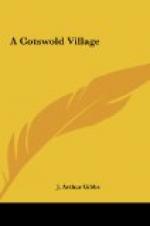“With dreadful faces thronged and fiery arms.”
And then the scene changed. The hills rose like graves of white men and barrows to the long-forgotten dead. Great oblong barrows, round Celtic barrows, and stately sarcophagi. Monumental effigies in alabaster, granite and porphyry; grim Gothic castles dating back to the foundation of the world, and grim Gothic cathedrals with long-drawn aisles, where the “great organ of Eternity” kept thundering ceaselessly. For the lightning and the thunder are powers to be reckoned with in those awful realms of chaos. And then the scene changed again. There suddenly uprose weird shapes of giants and leviathans, huge mammoths and whole regiments of fantastic monsters that looked like clouds and yet were mountains; and there were fortresses and towers of silence, with vultures hovering over them, and cliffs and crags and jutting promontories that looked like mountains, but were really clouds: for the black clouds and the frowning hills were so much alike that, save when the lightning shone, you could not say where the sky ended and the land began. But there was one gleam of hope in this weird and dismal scene, for on the farthest verge of the horizon there appeared, as it were, a lake—such a lake as saw the passing of Arthur, vanishing in mystery and silently floating away upon a barge towards the east. It was a lake of beryl, whose far-off golden shores were set with rubies and sardonyx, and beyond these, again, were the more distant waters of the silver sea; and as when Sir Bedivere
“...
saw,
Straining his eyes beneath
an arch of hand,
Or thought he saw, the
speck that bare the King,
Down that long water
opening on the deep
Somewhere far off, pass
on and on, and go
From less to less and
vanish into light.
And the new sun rose
bringing the new year,—”
so over the plains of Africa rose the mighty Alchemist and great revealer of truth, the scatterer of dreary darkness and secret night, turning those shadowy hills to purple and those mystic waters in the eastern sky to gold.
How different are our feelings when we traverse, either in reality or in fancy, such parts of the earth as are deeply blended in our hearts and minds with old familiar associations! Whilst wandering through the Lake District of England, how are we reminded of Wordsworth and the “Excursion”! How can we visit Devonshire and the West Country without summoning up pleasant thoughts of Charles Kingsley and Amyas Leigh; of the men of Bideford, Sir Richard Grenville, Kt., and “The little Revenge”? How vividly do the Trossachs recall “The Lady of the Lake” and Walter Scott! How with Edinburgh do we connect the sad story of Mary, the ill-fated queen! At Killarney, or standing amid the Gothic tracery of Tintern, how do we think on Alfred Tennyson and “the days that are no more”! These are only a few of the places in the British Isles




